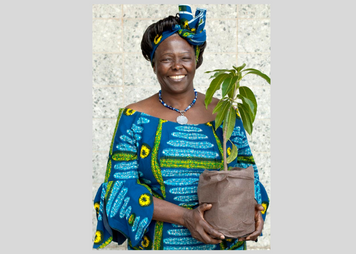
IPR is featuring some of the many female pioneers who have had an impact on the field of public relations in celebration of Women’s History Month.
Wangari Muta Maathai, Ph.D., was born in Nyeri, Kenya in 1940. In 1964, she obtained a degree in Biological Sciences from Mount St. Scholastica College in Atchison, Kansas, a Master of Science degree from the University of Pittsburgh in 1966, and then obtained a Ph.D. in 1971 from the University of Nairobi. Dr. Maathai was the first woman in East and Central Africa to earn a doctorate degree.
In 1976, while she was serving in the National Council of Women, Dr. Maathai introduced the idea of community-based tree planting. She was driven toward activism by a perceived connection between environmental degradation and poverty and conflict. She founded a broad-based grassroots organization for planting trees in Africa called the Green Belt Movement (GBM) in 1977. She mobilized Kenyans, particularly women, to plant more than 30 million trees, and inspired the United Nations to launch a campaign that has led to the planting of 11 billion trees worldwide. More than 900,000 Kenyan women benefited from her tree-planting campaign by selling seedlings for reforestation.
In 2004, Wangari Maathai was awarded the Nobel Peace Prize for her contribution to “sustainable development, democracy, and peace.” In recognition of her deep commitment to the environment, the United Nations (UN) Secretary-General named Dr. Maathai a UN Messenger of Peace in December 2009, with a focus on the environment and climate change.
Wangari Maathai died on September 25, 2011, after battling ovarian cancer.
References
Wangari Maathai
The Greenbelt Movement
Wangari Maathai, the woman of trees, dies
United Nations
Wangari Maathai
The Nobel Prize



